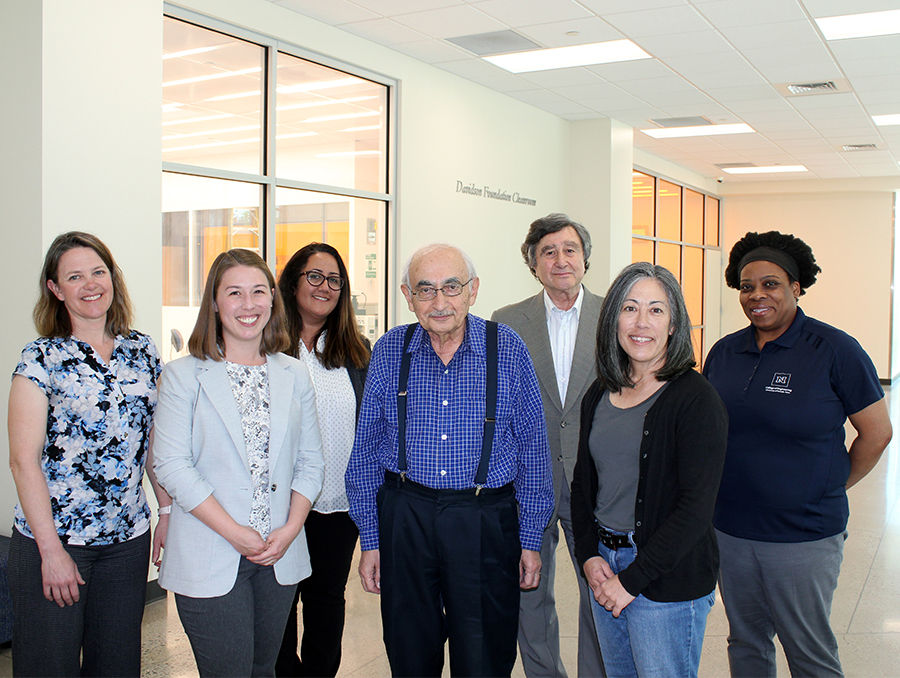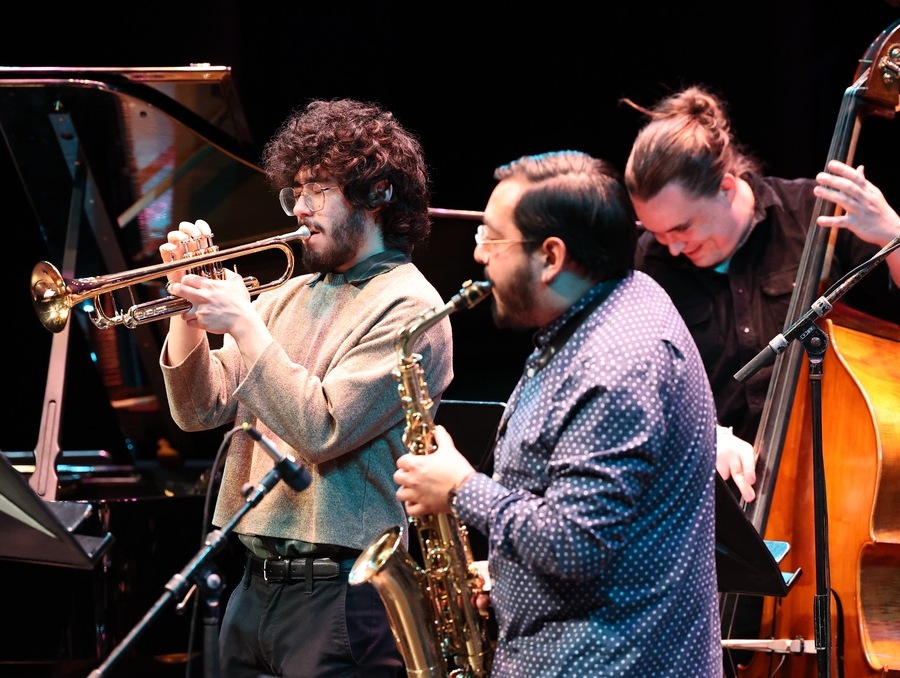With the beginning of instruction for the fall semester, the University of Nevada, Reno campus officially began its second, full academic year under the leadership of President Milt Glick.
After one year, Glick's imprint on the campus is apparent to anyone who has heard the Glick-produced phrases "culture of completion" or "sticky campus." As anyone who has spent any significant time with Glick, the University's 15th chief executive, will tell you, these words and many more like them are not idle chatter.
They have become a roadmap for where the University is headed during the latter half of the first decade of the new millennium, a series of "big-idea" concepts that can be quickly understood and quantified. Listen to talks from ASUN President Sarah Ragsdale, for example. She will mention "culture of completion" to her fellow students as often as Glick will mention it to the University's faculty and staff.
If there is a subtle theme behind the notion of increased retention and graduation rates—a subtext to the deeper pool of National Merit and Presidential Scholars (the number of National Merits, for example, has increased from one in 2006-2007 to 10 for 2007-2008)—it might be this: that the second year of the Glick presidency will be one of challenge. It will be a year where Glick will be asking the campus to increase its capabilities in many important areas, not the least of which is creating a campus culture that invites its students to spend more quality hours on campus (the new Joe Crowley Student Union is on target to open later this fall).
During a wide-ranging question-and-answer session with Nevada News, Glick addressed what he feels are some of the priorities for the coming year. He also talked about several of the "hot-button" issues facing the campus, including whether or not he feels increased admission standards help a University.
Nevada News: If you were to put a theme to the second year of the Glick presidency, what would it be?
Milton Glick: It will be absolutely increasing student success. And along with that, increasing our research capacity. If we don't maximize student success, then we will have failed as an institution, no matter what else we do, because the people expect that from us. It's not only important that we get students who can succeed at our University, it's equally important that our faculty is ready to engage and teach in meaningful ways. I think our faculty is ready to do this. We have a good faculty here, with a lot of pride, but I don't believe this has been an institutional focus.
Equally as important, we have to change the model for behavior so that students don't think of themselves as commuters, or simply as visitors to the campus. School has to be Job One for all of our students, not Job Two. We can have the greatest faculty in the world doing all of the right things, but in the end, the quality of the education is still the responsibility of the students. Students have to take on that responsibility. They can't do it, obviously, without all of the help and support that the faculty and staff provide. It begins with the students, though: If you want a really good education here, and you work at it from that perspective, you will get one.
NN: In addition to student success, you mentioned building the University's research capacity. Is this an attainable goal, particularly given that research dollars, on the national level, are becoming increasingly more competitive and difficult to attain?
Glick: I don't know that national research dollars have dried up. In some areas, there is probably more money available—it's just that the competition has increased greatly, particularly regarding NIH (National Institutes of Health), which doubled its budget and then gave bigger, and more long-term grants. With their budget flattened, they've still got commitments out there that they've still got to pay for, which makes the competition even harder.
This isn't the most serious problem. It's a problem, a challenge certainly, but from our perspective, the bigger challenge or problem is having the kind of research space that allows our faculty to be highly competitive, and that allows us to hire additional high-performing faculty. Other things are easier to solve. The hardest thing to solve is always space, because we haven't built a lot of research space. And even if we had the resources to do it, it takes a long time to catch up. The new Center for Molecular Medicine building (the University broke ground in March), which will be the first building ever built on our campus for medical research, should be a big stimulus.
NN: So in the interim, as we build more buildings like that, how do we attract more top-flight research faculty to come work and live in Reno? Is part of our recruiting spiel to these potential high-end researchers an article of faith that the space, eventually, will catch up to their needs?
Glick: It's partly an article of faith that, yes, if you come here, our space will catch up to your needs. But it's more an issue of finding ways to allocate and reallocate space, to renovate it. The space doesn't have to be perfect. But it has to be adequate.
It's also a major financial challenge. If you look, half of our space on campus is more than 50 years old. The amount of maintenance for these buildings is very high. It's not just maintaining this space; it's bringing it up to modern-day requirements. We've got to work very hard at this, and we've also got to work very hard at increasing our classroom space. We will be adding new classroom space, and it will be ready in the spring, in the old auditorium of the Jot Travis Student Union. This will be a good test for us, because it will help answer the question, 'Do we have faculty that are able to effectively teach in large classes.' And perhaps just as importantly, 'Are our students culturally prepared to take classes in these large classrooms?' It will be good space with good technology, and it will be a good test for us.
NN:Looking back at the past legislative session, what are some general observations you can make about the process, and what you might have experienced in Carson City last spring?
Glick: Well, first is that all politics is retail in Nevada (laughs). So it's very personal in Nevada. There aren't six degrees of separation. There's only one degree of separation in Nevada.
Second, I thought a lot of the time we had in front of the committees was spent explaining what we did the last time with money, why we made the decisions we made. They were "system" kind of issues, and I understand that. There were only a few times when we got to talk about what the University was, what it could become, and what we needed to do that. This is not a knock on the legislators, or the system at all. But I felt that we only had one day where the presidents actually could talk about what their hopes were, what their aspirations were, what their needs were. We spent a lot of time on what had been done historically; it would've been nice to spend a bit more time on what would like to become.
And again, this isn't a knock on the legislators. They listened carefully, they took us seriously, they had serious problems to face ... yet it would have been helpful to have more opportunity to talk about the future an dour potential to help the state's health and prosperity.
I was sorry that some of the debate centered on higher education versus K through 12. I believe we worked very hard, and I believe the chancellor and system office worked very hard, not to make it a 'higher ed versus K through 12' choice. It did become that, and I think that's regrettable, because neither of us can better at the expense of the other.
I was also very impressed at the cohesion between the institutions; that is, we had an agenda that the board (of regents) along with chancellor had set as priorities, and I thought all of the institutions really toed the line.
NN: Higher admissions standards for the four-year institutions in Nevada continue to be a hot-button topic. What are some of the general feelings you have about this issue?
Glick: I'm still a populist. I have concerns about limiting admissions too much. But I also understand that we can't admit students who are not going to succeed at our University. That's unfair to them, and unfair to the state.
I think we need to give institutions more flexibility to consider other factors during the admissions process. We've always been able to integrate the fact that somebody's a great violinist ... or that they're 6-foot-8 with soft touch. But these individuals still have to be able to succeed here. That is, we should never be in the business of taking people who are academically unqualified. But should we be considering the fact that you're a great violinist but that you may not shine in math? Or that you have overcome substantial adversity? Of course we should.
The real problem is this: Are we doing a good enough job of reaching out to certain communities, minority communities, and ensuring that they understand what it takes to gain admission, what it takes to earn a college education?
We're all in concert that we need greater diversity—for the sake of the University, and for the sake of the state. But sometimes that message is misread. Shannon Ellis (vice president for student services) and all of her people did a great job reaching out to the minority community heading into the last (grade-point average) increase. Their message was clear: We still want you ... we're not turning our back on you. And that's why we came out OK on this. Our African-American student enrollment is up, our Latino enrollment is a little bit down, but not much. We can be proud of this; however, our numbers are still too small, and we shouldn't sit back on our laurels. We should be saying, 'Our minority enrollment still needs to grow.'
NN: You're known as a hard-working president, but you've also developed a reputation for having a good sense of humor, a reputation as a guy who seems to enjoy what he's doing.
Glick: Learning is hard work, and it's important that all of our students realize this. I met with some athletes and their parents. I said, 'You wouldn't go out on that field without having practiced, without having gotten yourself into prime physical condition, without having said that you were going out there to win. Well, learning is the same way. You've got to practice, you've got to work hard at it, and you have to intend to succeed.'
We have to insist on that from all of our students, because that will help them succeed not only at the University, but in life. One of the things the University does is it teaches habits. The habits of hard work are difficult to attain, but once they are attained, they can lead to so much in a person's life.
I don't expect many other people get as much pleasure out of their work as I do. I'm very lucky that the job I do ... gosh, I don't want to say if they didn't pay me at all I'd do it, because that isn't true ... but certainly I don't just do it because it's a paycheck.
I do it because I think it's important work, I do it because I think it's fun work, I do it because it's engaging work. I do it because it'll help me live longer. We in the University get the opportunity to work with bright young people who are the future leaders. We have the opportunity to study interesting issues in creative ways. And, we get to work with a great group of colleagues.
All of this has great value to me. Hard work, if you do it right, can actually be very rewarding to most people. I know it is to me.











